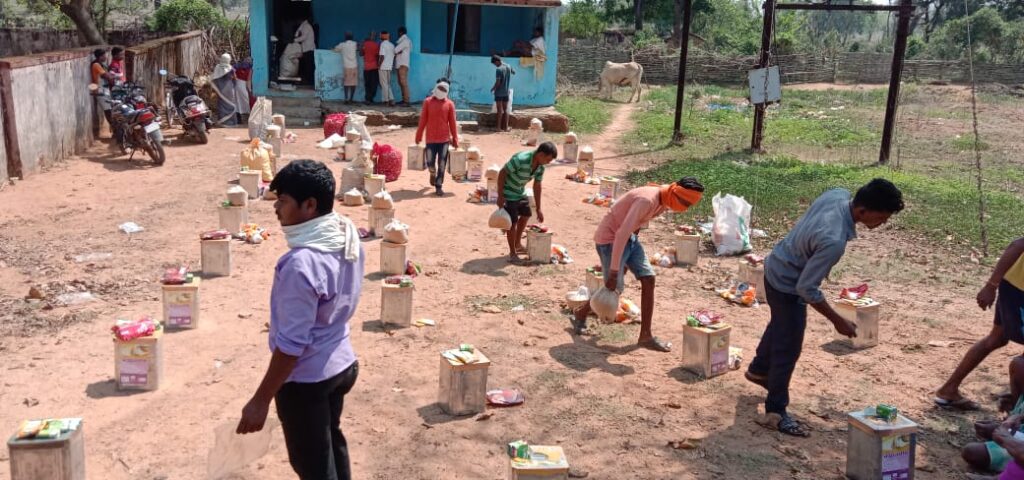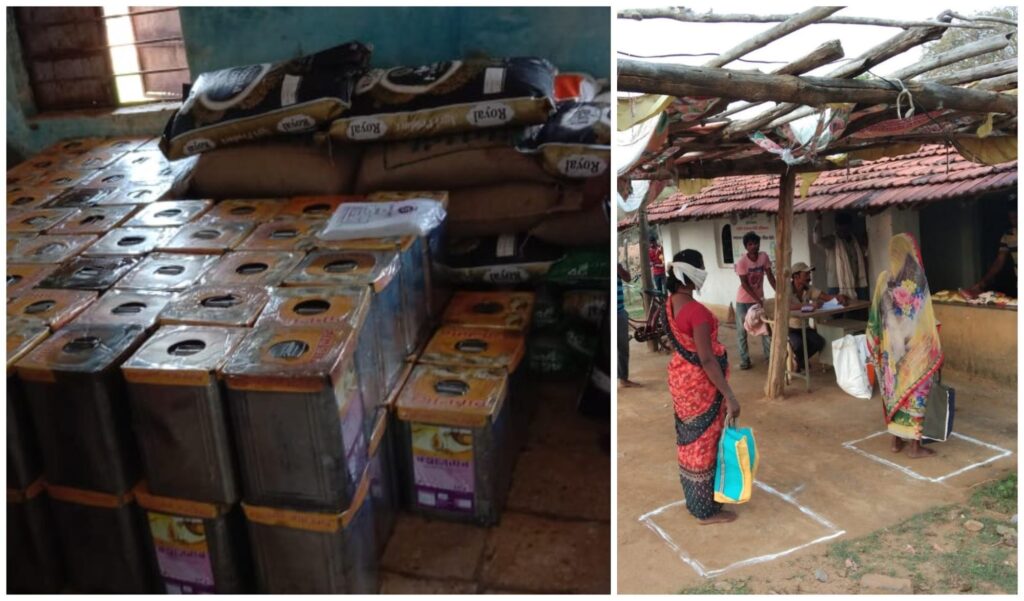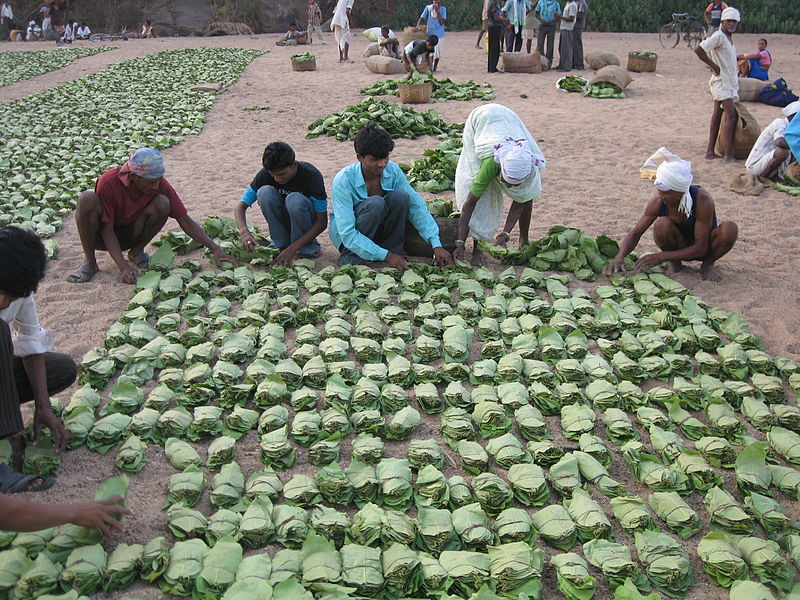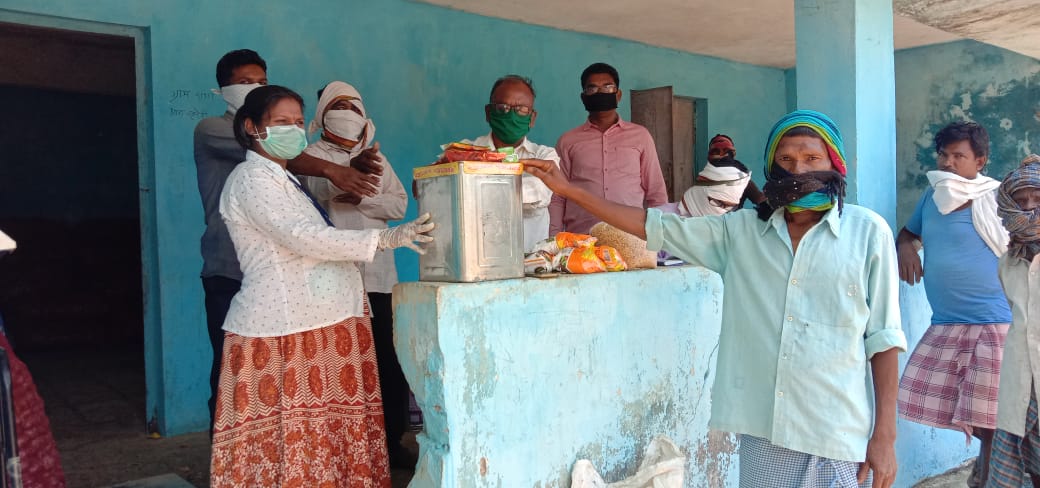This is not what a haat or a weekly market should look like: the place is not bustling with people buying and selling produce, there are no piles of seasonal vegetables from people’s farms, and there are no mahua flowers (Madhuca longifolia), or leaves and tembur fruit from the tendu trees (Diospyrus melanoxylon) from the village’s forest to be seen. Instead, the area is mostly deserted. In four queues, essential items are lined up at a distance of two metres each, waiting to be picked up by all of 115 families residing within the Panchayat.

This is the village of Kukdale in Gadchiroli District of Maharashtra. Here too, as in the rest of the world, the daily scheme of things has taken a hit thanks to coronavirus, and the subsequent lockdown across India. In this atmosphere, to ensure that no family in their village goes hungry during the lockdown, Kukdale’s Panchayat has swung into action.
“We could not assemble our Gram Sabha in the usual way, since everyone is maintaining social distancing,” explains Siaram Halami, a social worker and resident of Kukdale. “But all the Panchayat representatives discussed the matter over the phone and came to a decision.”
Using its own funds, the Panchayat bought vegetables from local sellers who had nowhere to sell their produce post the shutdown of the haats. They also bought some supplies of grains, oil, and pulses from grocery stores. These were then distributed amongst the residents of the village as weekly supplies.

The decision was a timely intervention in Kukdale, which lies in a district home to a vulnerable population—47 adivasi communities including Bhils, Gonds, Mahadeo Kolis, and Pawras reside here. Three Particularly Vulnerable Tribal Groups (PVTGs) along with many communities falling under the category of ‘other traditional forest dwellers’ also live in Gadchiroli.
For each family in Kukdale, the Panchayat allotted 20 kg of onion, 5kg of pulses, a tin of edible oil, 5 kg of garlic, 5 kg of salt, 25 kgs of rice, and 2 Dettol soaps, amongst other provisions to sustain the needs of a family for at least a week.
But, how did the Panchayat achieve such financial and political independence and empowerment?
Governing Their Own Forests with the Forest Rights Act
While many factors have contributed to the Panchayat’s financial empowerment, Halami points towards a significant one—gaining titles of Community Forest Rights over their forests under the Forest Rights Act, 2006 (FRA). As he reiterates, it was through the Act that the village was able to make decisions on managing their forests, which eventually led to financial independence.
In 2009, Gram Sabhas in Gadchiroli, including Kukdale, had begun filing for their Individual and Community Forest Rights under the FRA, an Act meant to ascertain the rights of communities dependent on forest land. In 2014, in recognition of their Community Forest Rights (CFR) under the Act, Kukdale became one of 87 villages in Korchi taluka to successfully claim and receive rights to sustainably use, manage, and protect its traditional forests.
Once CFR is recognised, the Act lays down the duties of the holders of forest rights. Some of these duties empower Gram Sabhas and other village level institutions to protect wildlife, forests and biodiversity, and ecologically sensitive areas. They also allow these institutions to regulate access to forest resources and stop any activities that adversely affect wild animals, forests, and biodiversity.
“We’re working hard so that our children don’t have to. Every tree we plant will bear fruit for them & make their lives easier”
On #IntlForestDay ??, watch how tribal communities in #Maharashtra, #India take ownership of their forest for themselves & their children pic.twitter.com/1V9Hp1sXFl
— UNDP India (@UNDP_India) March 21, 2018
It is important to note that in terms of the progress of FRA in the country, Maharashtra emerges as one of the leading states, especially in the implementation of CFR—as of March 2019, over 7,000 Community Forest Rights titles and over 1.6 lakh Individual Rights were recognised in the state, according to official data released by the Ministry of Tribal Affairs.
But interestingly, this success has been attributed to the high rate of recognition in a few select districts, particularly Gadchiroli. It was Gadchiroli’s villages of Mendha Lekha and Marda that became the first two villages in not just Maharashtra, but the whole of India, where Community Forest Rights were recognised. Kukdale soon followed suit.
In fact, if Gadchiroli is taken out of the picture, Maharashtra’s average performance of CFR implementation would stoop down to a disappointing 10%, according to a report by Community Forest Rights-Learning and Advocacy (CFR-LA), a training and advocacy group.
In Kukdale, once the government recognised the local’s community rights, it took about three years to raise awareness on the powers of collection, management, and protection the Gram Sabha now had over the forests. In 2017, the 87 villages in Korchi taluka formed a ‘ Korchi Maha Gram Sabha’—a federation to strengthen the local governance over their forests, including the collection and sale of tendu leaves. Found widely around Central India, these leaves are plucked and wrapped to make bidis. The collection of the leaves, especially in the months of May, has been one of the major sources of employment for many adivasis residing here.
“One thing that really changed after receiving the titles and understanding the duties was that although people had been using the forests for years, it was only now that they started to feel that they own the forests,” Halami mentions. “Before this, they attributed ownership to the Forest Department.”
Gaining Financial Independence
Now with their rights in hand, villages have started taking independent decisions about managing their forests. Bamboo, a useful resource for the people, although previously available was not abundant in the village. So, locals started growing it in their forests. Currently, the village is in the process of growing sitaphal (custard apples) and jamun—fruitful trees that they feel are useful to their neeeds.
Their financial independence is closely related to this freedom to manage their forests.
Section 3(1)c of FRA gives CRF holders the “right to ownership, access to collect, use and dispose of minor forest produce which has been traditionally collected within or outside village boundaries.” Once the community rights were recognised, the Gram Sabhas at the individual village level, with support from the Korchi Maha Gram Sabha, took a collective decision. Once all the produce obtained from the forests—like fruits, vegetables, fodder, mushrooms, flowers, tendu leaves—was sold, at least 20% of the revenue would have to be submitted to the village-level Gram Sabhas.
This is an important step towards financial independence, as before recognition of CFR, the Forest Department held the monopoly over the auctioning of tendu leaves from the forests. Only officials of the government could purchase the leaves and then sell them to government-appointed agents.
Another Act that has facilitated this financial empowerment in the region is the Panchayat (Extension to Scheduled Areas) Act (PESA), enacted in 1996. Under it, the state legislatures were directed to specifically endow Panchayats at appropriate levels with the ownership of Minor Forest Produce in Scheduled Areas. In Maharashtra through, the rules were notified only in 2014. Yet, even if delayed, its benefits are strongly felt: Under the Act, many villages have also used PESA to auction tendu leaves now, including those in Gadchiroli district.

With both these Acts implemented, 58 villages in Gadchiroli now hold over 8,000 hectares of tendu production area under Community Forest Rights—this accounts for about 6% of the total forest area under CFR in Maharashtra.
In Kukdale and the 86 other villages, this revenue collection began in 2017. Collectively, these communities in Korchi made a record-high turnover of over ₹ 21 crores over the next three years through sales of tendu leaves, as data from ISB Forest Governance, a multi-project research initiative focusing on CFR shows. These funds were used for several purposes. “Once, the funds were spent to buy desks for the school at the zilla,” Kumari Bai from Mahila Sangathan says, who works on concerns of health and education in the village.
The Korchi Maha Gram Sabha’s financial empowerment also meant the villages could independently make decisions to ease out specific troubles like falling market prices of tendu leaves. When this happened in 2019 for example, the Maha Gram Sabha still ensured that the maximum share of the revenue was given to the farmers and labourers involved in cultivation.
In the face of the COVID crisis at hand, it is this same fund which is now being spent to distribute essential food supplies to Kukdale’s residents. Here, it is not just empathy towards one another, but also laws that legitimise local-decision making and governance of resources that have empowered the people to fight this crisis. They were able to be out of the woods in this coronavirus crisis, because of their independent governance, well, over the woods.
Featured photograph courtesy of Siaram Halami






[…] [xxvi]https://thebastion.co.in/politics-and/out-of-the-woods-how-the-fra-is-helping-a-village-in-maharasht… […]